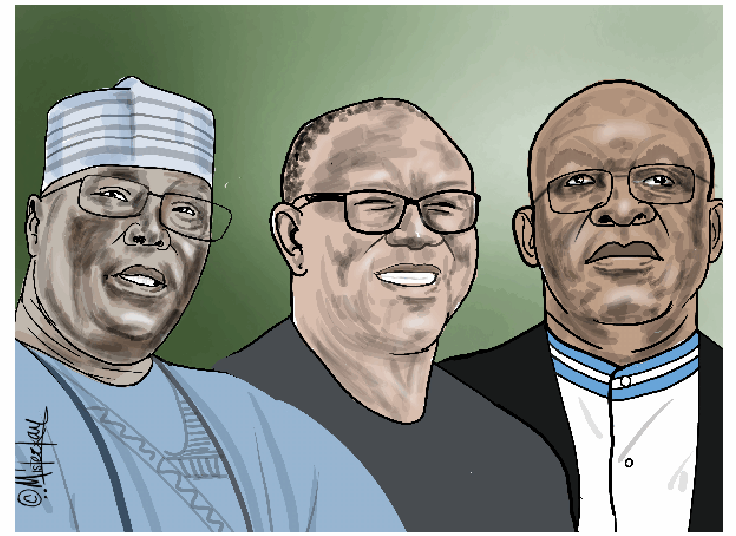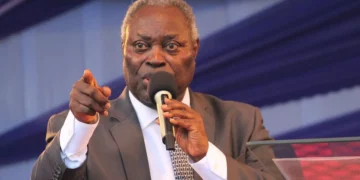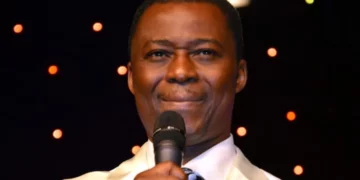Finally, the promised coalition of opposition politicians was unveiled last Wednesday as the former Senate President, Senator David Mark, and former governor of Osun State, Rauf Aregbesola, emerged as chairman and secretary, respectively, of the party, African Democratic Congress (ADC).
Even before the shouts of joy are yet to go silent over what some consider as a breakthrough by the opposition to coalesce into a strong political force to challenge President Bola Ahmed Tinubu in 2027, controversy is trailing what some describe as a deliberate attempt to seize the ADC by some old politicians to reap where they did no sow. As Nigerians watch the unfolding drama trailing the adoption of the ADC by bickering elements of the Peoples Democratic Party (PDP) and other Tinubu’s political traducers, the weeks and months ahead will turn out uncertain.
Power Grasp Contest
Leading the charge against the incumbent president ahead of the 2007 poll is the serial presidential candidate Atiku Abubakar. Since 32 years ago, the former Customs officer has never hidden his ambition to occupy the nation’s highest political office. Despite nearly two decades of seeking the number one position, Atiku has refused to back out in his quest to become Nigeria’s president.
His former running mate in the 2019 polls and the 2023 presidential candidate of Labour Party (LP), Peter Obi, is also not left out in the race. Though the unwritten zoning seems to favour the South, the pro-Atiku group is convinced that the former deputy president has all it takes to pull the carpet off the incumbent. Already, while a faction of the party, led by Senator Usman Nenadi, has thrown its weight behind the former Anambra State governor, another faction has delivered a 48-hour ultimatum to him to resign as a member of the party or risk expulsion. Another familiar face in the coalition is the former Rivers State governor, Rotimi Amaechi, who has also declared interest to contest the highest office in the land. Both Atiku and Obi have submitted their promise to serve only one term. However, many have dismissed the single term promise, insisting it is more of politics than reality.
Another top politician, who has been rendered irrelevant in the present dispensation, is the former governor of Kaduna State, Malam Nasir Ahmad el-Rufai, whose 2023 ministerial ambition was incinerated by Tinubu. Having lost out in being appointed minister, the former governor has declared that no stone will be left unturned to ensure Tinubu is permanently relocated to Lagos on retirement in 2027. The coalition made public on Wednesday is only a parade of the old order, whose major preoccupation is wresting power from Tinubu, who also is a tested hand in the dialectics of forming coalitions.
Still Entrapped
By far, the most frightening disharmony among the founders of the current opposition coalition is their refusal to surrender their personal ambition and embrace the sole objective of unseating President Tinubu in 2027. The presidential ambitions of Atiku and Obi, including the refusal of Amaechi to give up on his dream, are some of the hurdles the coalition must overcome. These presidential ambitions are gradually turning into threats that may throw spanners in the wheel if the opposition platforms must survive the intrigues by those claiming to be owners of the ADC.
Fears that the coalition leaders may be defective in managing both the centrifugal and centripetal forces pulling the ADC down the slippery slope of catastrophe, with the sole intention of weakening or even splitting the opposition voices, are becoming imminent. It’s now indisputable that the major anvil upon which the coalition was built is to wrest power from Tinubu.
Those at the forefront of the coalition are also those championing their ambitions, as what concerns them now is plotting to emerge winners of the presidential contest. If the ambition of the coalition leaders is to succeed the incumbent, then it will be practically impossible to attain the required synergy and pursue the vision of building a stronger opposition platform capable of posing a momentous challenge and uproot the APC-led administration. Those dismissing Tinubu as a no-factor due to what they claim are the administration’s disastrous footprints are only living in self-denial. There’s no doubt certain policies have left the citizens poorer, but there are no assurances that things will continue to be what they are.
Rough Road Ahead
It can only be simplistic to think that the unveiling of a coalition to unseat the incumbent clears the way for victory. It’s the first step and also the easiest. However, even with that, the cacophony of voices trailing the formation is indicative of the fact that the opposition has a tough journey ahead. Two hurdles must be cleared: The willingness of all aspirants on the coalition platform to unite behind any one of them, and getting someone to serve as an overwhelming unifier with the capacity for deep pockets and connections to upturn the tables against the Tinubu. As it stands, this coalition, only cobbled together to wrest power, lacks the character of unity and devotion for political victory at the polls.
Unlike in 2015 when the opposition got it easy in sweeping away Dr. Goodluck Ebele Jonathan from power, Tinubu is a different ball game, who is at home with all the nuances of power play. This president does not seem to be one that can easily be swallowed up in the intrigues of politics as practised in Nigeria, considering the footprints of his political conquests in more than three decades. For this coalition that was unveiled this week, there are still many rivers to cross, with several curves that have the potential of weakening the opposition.





